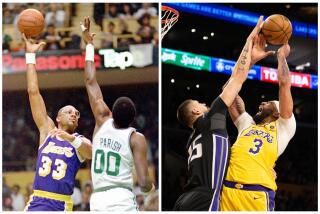Parenting : The Family Spectacle : Getting a first pair of glasses can be a turning point in a child’s life. Doing it right saves the child--and concerned parents--a lot of grief.
- Share via
Brian Murray and his 3-year-old son, Steven, were in Michael C’s Optical in Woodland Hills, helping each other pick out eyeglasses. Brian modeled a pair with brown frames.
“Brown is nice,” Steven said approvingly.
The optician helped Steven, who was getting his first-ever glasses, try on a pair with blue frames. “You look great in blue,” his dad said.
The two finished making their selections, and as they exited, Brian and optician Michael Chris winked at each other conspiratorially.
Brian’s eyesight is fine. He had just purchased an inexpensive pair of frames with clear lenses.
“I wanted to share the experience with Steven to help him feel comfortable,” he said. “It was something we could do together--like throwing a ball. We made a big deal about choosing frames and colors, so it was positive and special, as opposed to a problem.”
Like Steven, almost 20% of infants and children have vision abnormalities that can be corrected with glasses, according to the American Academy of Ophthalmology. The group recommends that children’s eyes be evaluated by a physician within the first six months of life and again at age 6 months to 1 year, age 3 and age 5.
Schools usually screen the vision of older children. In general, among those between 6 and 12 years old, myopia (nearsightedness) is the most common problem, while amblyopia (“lazy eye”) accounts for the majority of eye disorders in infants and toddlers.
Whatever the specific condition is, getting a first pair of glasses is a milestone in a child’s life. While certainly not the most traumatic event a family will experience, it is a big deal--and often most difficult for the parents.
*
“First-timers really need their hands to be held--not the kid, but the parent,” Chris said. “Some are in tears because they think their child has some kind of defect. But it is so normal! Just about everyone has some kind of refractive error (in their vision.)”
Many parents wonder how to persuade antsy young children--who may have trouble keeping shoes on their feet--to wear their glasses. Surprisingly, though, eyeglasses usually pose less of a problem than parents expect, according to Dr. Sheryl Handler, an Encino pediatric ophthalmologist.
“Most kids who need glasses really want them, like them and are dedicated to them,” she said, “to the point where parents have to slip their glasses off when the child falls asleep or takes a bath. Their glasses open up their whole life; they experience major improvements in all their skills.”
*
Parents can also be relieved to learn that the stigma faced by spectacle-wearing children during previous eras has all but disappeared. “Eye wear is trendy and fashionable now, and there are so many (kinds of glasses) to choose from,” Chris said. “A lot of kids are very excited about getting glasses, and they look so cute in them that a brother or sister--who doesn’t need glasses--will be jealous and want a pair too.”
Little Steven’s mother, Kathleen Murray, admitted she was upset to learn that Steven needed glasses. “It really bothered me,” she said. “I remember when I was growing up how cruel kids were.” She was relieved when, instead, the neighborhood children clustered around Steven in admiration--then turned to their parents demanding glasses for themselves.
On the other had, many adolescents--especially girls--may be reluctant to wear glasses, according to Handler.
“Girls around 12 years old have all the tough preteen issues,” she said. “They are at that tough time in life when everything is so fragile. They will often do anything not to wear glasses because they think it will be socially difficult. All it takes is one person to tease them, and they feel awful.’
Such adolescents--if they are mature and responsible enough--may be good candidates for contact lenses.
“It is a matter of hygiene and dexterity,” Handler said. “Medical problems come about if contacts are not properly removed and cleaned. Kids who put their hands everywhere and play outside in dirt and sand should not be put in contacts.”
Ariel Young, 16, of Woodland Hills has worn contacts since she was 12 years old. “They are a lot of responsibility, but it is worth it,” she said. “My glasses were always slipping off my nose, and I never liked any frames or the way they made my eyes look. I like the way I look without glasses better.”
Her father, Gary Young, believes Ariel, as well as her younger sister, Robin, 9, look “adorable” in glasses. Both girls were fitted for their first pair at 9 months old.
“If we have to have a problem, this is not the worst one that can happen--and it is correctable,” he said.






